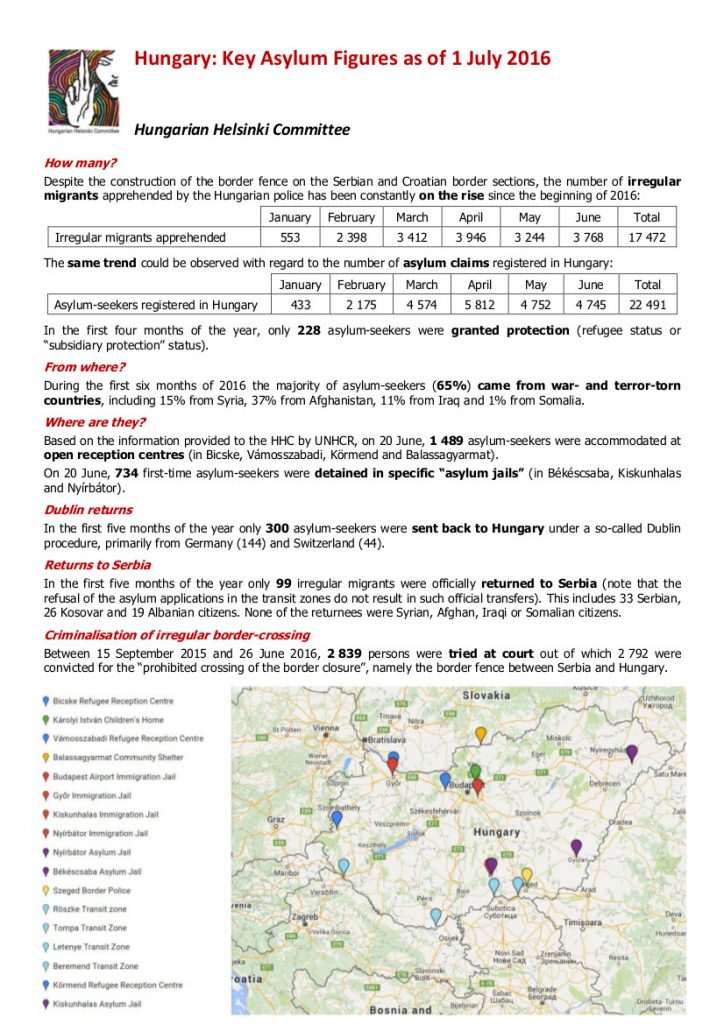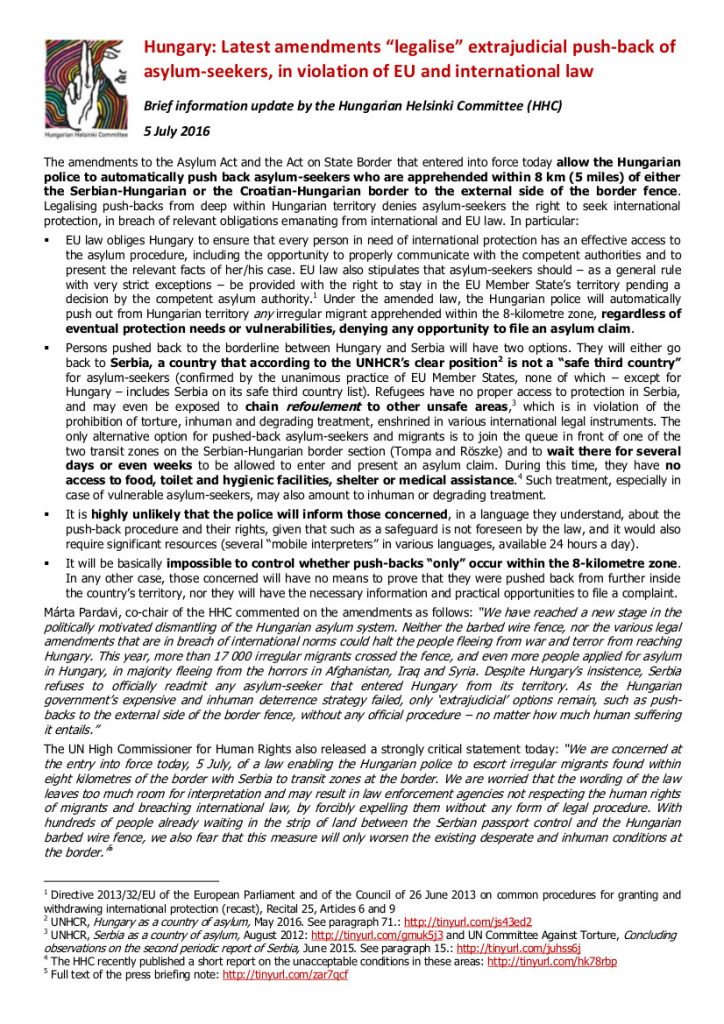A massive security operation, involving up to 10,000 police and soldiers, is under way along Hungary’s southern border with Serbia, to keep out migrants and refugees.
Last week a 10-year-old Afghan boy drowned while trying to wash in a pond nearby. His mother walks aimlessly through the camp with her other children, too sad to speak to anyone. The UNHCR is mediating with the Serbian and Hungarian authorities about where to bury the dead boy.
Human Rights Watch: Hungary – Migrants Abused at the Border
“Hungary is breaking all the rules for asylum seekers transiting through Serbia, summarily dismissing claims and sending them back across the border,” said Lydia Gall, Balkans and Eastern Europe researcher at Human Rights Watch. “People who cross into Hungary without permission, including women and children, have been viciously beaten and forced back across the border.”
Hungarian Border Closure Hits Serbian Refugee Efforts
Humanitarian aid groups supporting refugees in the Serbian capital Belgrade are warning that they are being stretched by the increasing numbers returning from the closed border with Hungary as well as those arriving from Bulgaria and Macedonia, hoping to reach western Europe. “A lot of those people from the Hungarian border are coming back to Belgrade and we, along with several other organisations, are distributing food for them and also for the newcomers,” Tijana Sijaric, a humanitarian worker at the Info Park aid centre in Belgrade, told BIRN. The increased numbers have put pressure on their limited resources, she said. “On Sunday, we almost had a riot here since we could not provide a meal for everyone. It was not good at all,” she added.
Migrants stuck in squalor at Hungary-Serbia border
UN agencies in Serbia now report that, as a result of the new law, the number of refugees and migrants on the Serbian side of the border has doubled over the past few days to more than 1,300, most of them women and children. The UN said that some 800 asylum-seekers are waiting in the open on Serbian territory outside the Hungarian transit zone, “where overall conditions, particularly lack of shelter, health and sanitation represent major challenges”.
HHC: Hungary: Key Asylum Figures as of 1 July 2016
-
In the first four months of the year, only 228 asylum-seekers were granted protection.
-
[O] on 20 June, 1.489 asylum-seekers were accommodated at open reception centres (in Bicske, Vámosszabadi, Körmend and Balassagyarmat). On 20 June, 734 first-time asylum-seekers were detained in specific “asylum jails” (in Békéscsaba, Kiskunhalas and Nyírbátor).
-
In the first five months of the year only 300 asylum-seekers were sent back to Hungary under a so-called Dublin procedure, primarily from Germany (144) and Switzerland (44).
-
Between 15 September 2015 and 26 June 2016, 2.839 persons were tried at court out of which 2.792 were convicted for the “prohibited crossing of the border closure”.
Ungarische Regierung: The police and army are prepared for the new border protection system, says Chief Security Advisor
National Police Commissioner Károly Papp told reporters that 826 people had attempted to illegally cross the border between midnight on Monday and midday on Tuesday. Patrolling police and border control officers prevented 675 attempts at illegal entry, while the remaining 151 people were apprehended within the eight-kilometre zone and escorted back to the border; all the illegal immigrants cooperated with police.
Ungarn: Ja oder Nein zur EU-Flüchtlingspolitik?
Wohl keine Regierung eines EU-Mitglieds ist so offensiv gegen die EU-Flüchtlingspolitik wie die des rechtskonservativen Ungarn Orban. Schon vor Monaten kündigte er ein Referendum an, jetzt macht seine Regierung ernst: Am 2. Oktober sollen die Ungarn abstimmen. Die Ungarn stimmen am 2. Oktober in einem Referendum über die Verteilung von Flüchtlingen innerhalb der Europäischen Union ab. Das Datum hat Präsident Janos Ader jetzt bekanntgegeben.
Amnesty International: Hungary: Crackdown on the rights of refugees and migrants continues unabated amidst European Commission inaction
Amnesty International notes with concern the recent legal and policy developments in Hungary, which have further deteriorated the situation of refugees and asylum-seekers seeking protection in the country and have caused ongoing suffering to them. The organization is calling on the European Commission to use all necessary means to ensure the
country’s full compliance with their obligations to respect, protect and fulfil the rights of refugeesand migrants under EU and international law, including by following through the infringement proceedings launched against Hungary in December 2015.
HHC: Hungary: Latest amendments “legalise” extrajudicial push-back of asylum-seekers, in violation of EU and international law
The amendments to the Asylum Act and the Act on State Border that entered into force today allow the Hungarian police to automatically push back asylum-seekers who are apprehended within 8 km (5 miles) of either the Serbian-Hungarian or the Croatian-Hungarian border to the external side of the border fence. Legalising push-backs from deep within Hungarian territory denies asylum-seekers the right to seek international protection, in breach of relevant obligations emanating from international and EU law.
SZ: Endstation Niemandsland
Die Situation an der Grenze zu Ungarn verschärft sich seit dem 5. Juli kontinuierlich. An diesem Tag trat in Ungarn eine neue Regelung in Kraft, die es den Grenzpolizisten erlaubt, Migranten, die bis zu acht Kilometer von der Landesgrenze entfernt aufgegriffen werden, direkt nach Serbien zurückzuschicken. Allein am vergangenen Wochenende transportierte die ungarische Regierung nach eigenen Angaben 217 Menschen zurück nach Serbien.Ärzte ohne Grenzen (MSF) berichtet, dass diese Ausweisung aus Ungarn oft gewaltsam geschieht. „In den vergangenen Monaten erzählt eine steigende Zahl unserer Patienten von Misshandlungen durch ungarische Beamte“, sagt Simon Burroughs, Leiter der MSF-Mission in Serbien. „Migranten werden zunehmend wie Kriminelle behandelt.“ Zurück auf der serbischen Seite der Grenze sind Hygiene und Versorgung das zentrale Problem. Es gibt kaum Toiletten und keine Duschen. Freiwillige aus verschiedenen europäischen Ländern bemühen sich gemeinsam mit Hilfsorganisationen um die Versorgung der Gestrandeten. Doch gerade Kleinkinder leiden unter Mangelernährung. Eine Situation, die an das aufgelöste Lager im griechischen Idomeni erinnert. Aus Protest gegen ihre Situation traten am Freitag in Belgrad mehr als 140 Geflüchtete in einen Hungerstreik und marschierten anschließend gemeinsam zur ungarischen Grenze. Sie fordern die Möglichkeit, in der Europäischen Union einen Asylantrag zu stellen. Serbien hatte die Menschen aus Afghanistan, Syrien, Pakistan und dem Irak, die in der Nähe des Bahnhofes campierten, lange toleriert. Am Freitag begann die Stadt Belgrad den Park umzupflügen, in dem die Migranten zelteten.


